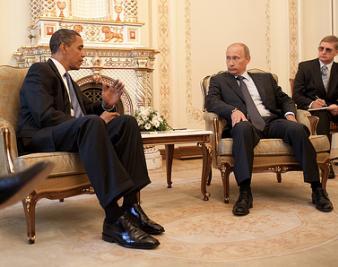|

Russian Foreign Minister Sergei Lavrov met with his Saudi counterpart on Tuesday over the crisis in Syria. Is Moscow’s diplomacy an effort to resolve a humanitarian catastrophe–or to shift international attention away from Russia’s activities in Ukraine?
In his State of the Union speech, President Barack Obama bragged that his administration led the international effort to isolate Russia for its invasion of Ukraine. More recently, however, Ukraine has largely disappeared from the U.S.-Russian agenda.
Since Secretary of State John Kerry met with Russian President Vladimir Putin and Mr. Lavrov in Sochi in May, the U.S.-Russian agenda–as addressed in calls between Mr. Obama and Mr. Putin and in numerous meetings between Mr. Kerry and Mr. Lavrov, including two last week–has focused on Syria and Iran. President Obama told New York Times columnist Thomas Friedman last month that “Russia was a help” on the Iran nuclear deal. “I was not sure given the strong differences we are having with Russia right now around Ukraine, whether this would sustain itself. Putin and the Russian government compartmentalized on this in a way that surprised me, and we would have not achieved this agreement had it not been for Russia’s willingness to stick with us and the other P5-Plus members in insisting on a strong deal.” Mr. Obama, who said he was “encouraged” that Mr. Putin called him to talk about Syria, also said: “I think they get a sense that the Assad regime is losing [its] grip … and that the prospects for a [Sunni jihadist] takeover or rout of the Syrian regime is not imminent but becomes a greater and greater threat by the day. That offers us an opportunity to have a serious conversation with them.” Before U.S. officials get too too hopeful about “serious conversation” with Moscow on Iran and Syria, let’s consider Russia’s track record: Since 2011, Russia has provided diplomatic and military support vital to keeping Bashar al-Assad in power. More than 230,000 Syrians have been killed in the country’s civil war and more than 7 million displaced. In its latest diplomatic overtures, major difference remain over Russian insistence on keeping Mr. Assad in power. Russia agreed in November to construct new nuclear reactors for the Tehran regime. In April, it reopened a deal for S-300 surface-to-air missiles to Iran. Moscow joined Tehran in insisting that arms and missile embargoes against Iran be lifted as part of the nuclear negotiations. In defiance of an international travel ban, Iranian Quds force commander Qassem Soleimani met with Mr. Putin and other Russian officials in Moscow last month. And during his travels to the Gulf region last week, Mr. Lavrov met with Hamas leader Khaled Mashaal and invited him to Moscow. Hamas has been designated a terrorist organization by not just the U.S. but also the United Nations and the European Union. U.S. sanctions against Russia over its aggression toward Ukraine remain in place, but the Obama administration’s isolation of the Putin regime has ended. With Russian violations of the February cease-fire on the rise and Ukrainian casualties mounting, Ukrainians fear they are being sacrificed in the pursuit of broader U.S.-Russian cooperation. By pretending to play a constructive role in the Middle East, Mr. Putin shifts attention away from the havoc he is wreaking in Ukraine. The question is how long it will take U.S. officials to see this.
| 


